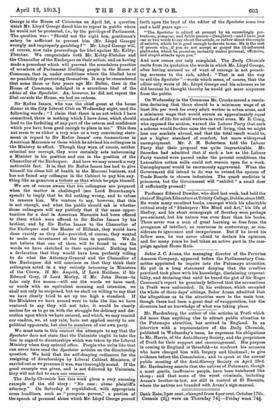We are of course aware that his colleagues are prepared
when the matter is challenged (see Lord Beauchamp's speech) to imply that he did nothing wrong, and to refuse to censure him. We venture to say, however, that this is not enough, and what the public should ask is whether those colleagues will say publicly that if the same oppor- tunities for a deal in American Marconis had been offered to them which were offered to Sir Rufus Isaacs by his brother, and by Sir Rufus Isaacs to the Chancellor of the Exchequer and the Master of Elibank, they would have done exactly as they did—provided, of course, they wanted to make an investment at the time in question. We dc not believe that one of them will be found to use the words we have sketched or their equivalent. Nothing but a declaration that they would have been perfectly willing to do what the Attorney-General and the Chancellor of the Exchequer did will convince us that they think their colleagues acted in a way entirely becoming in Ministers of the Crown. If Mr. Asquith, if Lord Haldane, if Sir Edward Grey, if Lord Morley, if Mr. John Burns—to take only five names—will use the words we have used, or words with an equivalent meaning and intention, we shall not only be surprised, but we shall be willing to say that we have clearly tried to set up too high a standard. If the Ministers we have named were to take the line we have ventured to say they will not take, it would be clearly useless for us to go on with the struggle for delicacy and dis- cretion upon which we have entered, and which, we may remind our readers, we, at any rate, have not applied merely to our political opponents, but also to members of our own party.










































 Previous page
Previous page